- Home
- Claudia Mills
Zero Tolerance Page 4
Zero Tolerance Read online
Page 4
“What do I care?” Tiffany finally said.
“Mitch?”
“Someone jumped her when she was doing nothing, and then she got in trouble for fighting.”
“Then where’s the other kid?”
Mitch shrugged. “In the hospital getting stitches on her face.”
“Warm or cold?” Luke asked Sierra.
Well, it was sort of warm, in that she was in trouble even though she hadn’t done a single thing that was wrong, and it was all completely unfair. But Sierra would never hit someone.
Still: “Warm, I guess.”
“You were in a fight?”
“No! But I’m here for a reason that’s completely unfair. Like being here for fighting if someone else started the fight—that would be completely unfair.”
“Yeah,” Mitch said, glaring again at Luke.
“Come on, Tiff, take a guess,” Luke urged.
“Why don’t you take a guess?” Tiff had started painting her fingernails. She was squinting down at them with fierce concentration.
“Okay.” Luke turned toward Sierra. “You cheated on a test. And you think it’s unfair that you got caught because you really need an A on the test so that you can get into a special talented and gifted summer camp, which you need to put on your application when you apply to Princeton someday. Warm or cold?”
“Cold! I would never cheat. And if I did, and I got caught, I couldn’t say it was unfair, because it would be totally fair.”
“I give up. Tiffany, help!”
“You were hooking up in the stairwell with someone.” Tiffany extended the fingers of her left hand and studied them intently.
“No!” Sierra felt her cheeks flaming. The closest she had come to kissing a boy was imagining kissing Colin, wondering if his lips would be as soft as his voice.
At this rate, it would be better just to tell them.
“Okay, I brought my mother’s lunch to school. By mistake. We both have the same lunch bag. And she had an apple, and a knife for cutting it. I turned in the knife right away. I gave it to Sandy, and now…”
Sierra’s voice was trembling. It was impossible that this thing had happened to her not even twenty-four hours ago.
Luke gave a low whistle.
“You’re screwed,” he said.
Sierra thought his look had some pity in it. Mitch had also winced with painful understanding. Tiffany had started in on the fingers of her other hand.
“No, I’m not,” Sierra said. “My father is an attorney. Like a really big-time attorney, and he’s going to get it all straightened out. He is.”
“And you think I’m going to get in trouble for using my Game Boy?” was all Luke said.
9
The morning lasted forever. Every time the bell rang for the end of another period, Sierra thought about another class she had missed, more work that she would have to make up. The boys played games on their Game Boys; Tiffany sat doing absolutely nothing except thinking her own thoughts. Sierra dutifully copied out note card after note card, but even the most perfect straight-A student would find research boring after almost three hours.
When the bell rang for the start of 4A, Ms. Lin appeared for the third or fourth time in the room. Each time, the Game Boys vanished the instant her clicking heels sounded down the hall.
“If you brought your lunch, you may eat it now,” Ms. Lin said. “If not, Mrs. Saunders will take you to the cafeteria, where you will buy your lunch. You will return with your tray and eat here in the suspension room.”
Sierra had brought money to buy her lunch; she had decided that morning that she never wanted to take the risk of bringing a lunch from home ever again. But now the shame of being led to the cafeteria with an escort—a prison guard—was unbearable.
“I’m not hungry,” Sierra said.
Ms. Lin pursed her lips. “Suit yourself. But if you don’t go now, you can’t go later.”
Luke and Mitch followed Ms. Lin out of the room. Tiffany pulled a crumpled-looking paper bag from her backpack. In it was a sandwich, a can of soda, a bag of chips, and a bag of store-bought chocolate-chip cookies.
“Want some?”
Tiffany shoved her bag of chips toward Sierra.
“Sure. I mean, thanks.”
Sierra took a few chips from the bag.
Wordlessly, Tiffany pushed her bag of cookies toward Sierra as well. Sierra took one of those, too.
“Thanks,” Sierra said again.
She couldn’t think what else to say. She knew she wasn’t supposed to ask if the nose ring hurt. Or if it was awkward blowing your nose with a ring in the way.
“I think it was gutsy, what you said to Ms. Lin,” Sierra finally said.
“You don’t even know what I said.”
“Luke said you said something. Something bad enough to get you suspended.”
“Just for one day. And it wasn’t like a big, brave, heroic moment. I was pissed off.”
“I don’t see why you can’t wear a baseball cap if you want to.”
Especially if they let you wear a nose ring.
Tiffany shrugged. “It’s their school. I guess they can make whatever rules they want.”
“It’s not their school. The school belongs to all of us.”
“It doesn’t belong to me.”
The boys returned, carrying their trays. The hot lunch was pizza, cut in rectangular slabs, with a small paper cup filled with cooked green beans and another small paper cup filled with applesauce.
Sierra should have swallowed her pride and gotten the school lunch. It had been horrible having to go without lunch yesterday, and now here she was, missing lunch again. Three potato chips and one cookie hardly counted as a meal.
“Aren’t you going to eat anything?” Luke asked her.
“It’s too late now. Ms. Lin said so.”
“You can have my green beans. I don’t want them, but it’s a law or something that they have to give them to you anyway, so the lunch will count as nutritious. I’m just going to throw them away.”
“You can have my green beans, too,” Mitch said. “And my applesauce.”
Sierra accepted both offers gratefully.
Her mother always said that everything happened for a reason. Maybe the reason Sierra had gotten a completely unfair in-school suspension was so she could learn that the bad kids weren’t as bad as she had thought they were, that they were actually pretty nice.
If so, she had learned that lesson by noon on the first day.
I get it, Sierra silently told the universe as she chewed on Mitch’s rubbery, cold green beans. I really do. Can I go back to class now?
But the universe didn’t bother to reply.
* * *
There was no window in the suspension room. Rain, sleet, snow could fall for hours, and it would make no difference to the unchanging, boring fate of the prisoners within.
When the closing bell finally sounded, Sierra shouldered her backpack and headed out to the front hall. Maybe Em or Lexi would be looking for her before they went to the home basketball game. Maybe even Colin. He was the kind of boy who noticed when things weren’t right. He might have figured out where she was and be loitering inconspicuously by the front office, just in case.
“Darling!”
It was her mother, her face pale with worry. Sierra let herself be enfolded in her mother’s hug.
“Are you okay?” her mother asked anxiously. “I thought about you every minute all day long. I’ve been waiting here for the last half hour.”
“I’m okay. Can we go now?”
“Of course. I have the car right outside. There are a whole bunch of news vans lined up for something—did you hear of anything going on? Anyway, I parked in the no-parking zone.”
Her mother gave a forced chuckle. Oh, the Shepards were becoming daring. That rebellious, rule-defying mother-daughter pair!
Sierra stayed within her mother’s encircling arm as they walked outside into the biting January air.
In the asphalt circle in front of the school she saw not one, not two, but three panel vans with big dish antennas on top. On the side of the closest one Sierra could read the words “9NEWS” with the familiar station logo. Something big indeed must have happened at school today while she was locked away in her windowless room.
Then: “There she is!” she heard someone yell from the cluster of reporters and cameramen standing together by the vans.
“There’s Sierra Shepard!”
10
The TV cameras drew closer as Sierra and her mother walked together down the front steps of the school. When they reached the sidewalk, a woman with perfectly coiffed blond hair, every strand welded into place by industrial-strength hair spray, was by Sierra’s side, pointing a microphone toward her.
“Sierra,” the woman said pleasantly. “Sierra Shepard, right? We’re here to get your side of the story. Tell us what happened.”
Sierra looked over at her mother. Was she supposed to answer or not? She remembered once seeing someone on the news, a man in a business suit, striding past a long row of reporters and cameras, holding up a newspaper to shield his face. Besides, how did the blond reporter and the cameraman know?
“Oh my God,” her mother said in a low voice. “Your father said he was going to try to get some media attention for you, but I have to admit, I didn’t expect … this.” She sighed. “Go ahead and talk to them, sweetie.”
“You brought the wrong lunch to school,” the reporter prompted her.
“Um—I brought my mother’s lunch, instead of mine, because we have the same lunch bag. I mean, our lunch bags look the same, and there was a little knife in it to cut an apple, and I gave it to the lunch lady right away, because I know we’re not supposed to have knives at school.”
“You turned it in the second you saw it?” the woman asked, even though that was exactly what Sierra had already said. “The instant you realized the mistake?”
“Yes.”
Now another reporter was there, a man in a dark suit and a red tie, accompanied by his cameraman, too. The dark-suited reporter thrust his microphone close to her face.
“Have you ever been in trouble before, Sierra? Any previous suspensions? Detentions?”
“No, I’m in Leadership Club and—”
“What’s the lowest grade you’ve ever received?”
“I got a B once, last year, third quarter, in earth science.”
“You got a B once,” he repeated. “Do you think Longwood Middle School’s handling of this incident has been fair to you, Sierra?”
Even after everything that had happened, Sierra still felt disloyal criticizing Mr. Besser in public. He’d be angry at her; he wouldn’t like her anymore. But she had to speak up for herself.
“No,” she said. “I think it was unfair. It’s completely unfair.”
“Why?”
“Because it was a mistake, and I turned it in right away. I tried to do the right thing!” Sierra felt her voice start to wobble.
A third reporter, crowding close with his microphone, interrupted. “So you don’t think you should be expelled”—he emphasized the word carefully—“just for trying to do the right thing?”
Now Sierra’s eyes were filling with tears. Blinking hard, she turned away, knowing that the cameras were still trained on her, capturing every expression, including the shaking of her slumped shoulders.
“Are you Sierra’s mother?” she heard the blond reporter ask.
Sierra slipped away and dropped down onto a large flat rock by the side of the school entrance, while her mother answered more questions.
“Hey.”
She heard a soft voice. A soft male voice.
It was Colin.
“Celeste told me that you’re suspended.”
Sierra nodded. She could imagine Celeste bustling about, pleased to be the first one to inform everybody, not that Celeste could have had any way of knowing for sure. But Celeste would have noticed that Sierra was absent all day and drawn her own conclusions, pleased to have been proven right yet again.
Didn’t you know? Sierra’s going to be expelled.
Standing while she was sitting, Colin looked taller than he actually was. The slight breeze, which had probably made Sierra look all windblown for the TV cameras, now lifted Colin’s brown bangs off his face. Even though it was cold, he was wearing a hoodie, not a jacket.
“I think that’s really unfair,” he said.
It wasn’t worth all this hideousness to have Colin Beauvoir gazing down at her with sympathetic, troubled eyes. But almost.
“I do, too.”
“What’s going to happen? Do you think they’ll really expel you?”
“My dad’s going to try to fix it.”
She pointed to the panel vans for the three news stations. “I just talked to some reporters. For the TV news.”
“Wow. I never knew anyone who was on TV before.”
“Well, you never knew any big-time criminals before.”
There. She had even made a joke about it.
“I’ll be sure to watch the news tonight,” Colin said.
Sierra hoped her hair wouldn’t look too awful. She should have asked for time to comb it first. Plus, people said the camera put on ten pounds of weight. She’d look dumpy and fat, red-faced and ready to cry under her wind-mussed hair.
“You don’t have to watch it.”
It was a dumb thing to say: of course he didn’t have to.
“It’ll be cool if you’re on TV.” Colin smiled at her.
If his hands hadn’t been jammed in his hoodie pockets, maybe they’d have been trembling in that poetic way she loved so much.
“Well, see you,” Colin said.
If only she could be back in class tomorrow, sitting next to him.
“See you,” she echoed.
* * *
When Sierra and her mother got home, there were seven calls on the answering machine from different newspapers all around the state, from the Associated Press, even from The New York Times. Each reporter left a cell phone number, asking Sierra to call back as soon as possible, any time; however late it was didn’t matter.
“Your father,” Sierra’s mother said, “has been busy.”
“Do I have to call them? All of them?”
Her mother nodded. “I know your father wants you to.”
“What should I say?”
“Just what you’ve been saying. Keep telling the truth, that it was all a mistake, and that you turned in the knife the instant you found it. But first let me make you a snack. You must be hungry. What did you have for lunch?”
Sierra thought of Tiffany’s potato chips and cookie, the boys’ small paper cups of green beans and applesauce.
“I’m starving.”
“I’ll make you a grilled cheese sandwich. Would you like that? And some tomato soup? Go sit down and relax in the family room, and I’ll bring it to you.”
Sierra curled up on the couch and pulled an afghan over her legs. Cornflake came meowing; she patted the blanket, and he jumped up on her lap and began purring.
Idly, Sierra picked up the remote and clicked on the TV. It was set to CNN, her father’s favorite channel.
At the bottom of the screen, the news banner scrolled by. COLORADO HONOR STUDENT FACING EXPULSION FOR BRINGING THE WRONG LUNCH TO SCHOOL.
Sierra stared at the TV.
11
By four-thirty, Sierra had talked to six reporters; she had left a message for the seventh, but he hadn’t called her back yet. Each time she told the reporter the exact same story in almost the exact same words. By the sixth time, it had all begun to feel like just that, a story: something that had happened to somebody else, and not to her at all. She no longer felt her heart jam itself up against her ribs when she heard the question “Do you think you’re going to be expelled?” Instead, she just answered “No.”
There was no way that she, Sierra Shepard, was really going to be expelled fr
om Longwood Middle School forever for one teensy, tiny, innocent mistake.
Each time she said it, she believed it more.
When she checked her phone, she saw she had tons of texts from Celeste, Lexi, and Em. She was too drained to call anyone now. Let them worry about her for a while, her friends who had been allowed to sit in class all day working toward their good grades while she was in prison—with Luke Bishop!—eating the cold green beans that Luke would otherwise have thrown away.
The doorbell rang.
For a fleeting moment Sierra wondered if it could be Mr. Besser, come to apologize, come to tell her he had changed his mind and her suspension was over. The same reporters had probably called him, too; maybe by the time he had repeated his defense of his zero-tolerance policy a dozen times it had started to sound as lame to him as it would to the entire rest of the universe.
Sierra’s mother answered the door. From upstairs, Sierra heard her say, “Girls! Come on in!”
Celeste was the first to burst through the door into Sierra’s room, with Lexi and Em right behind her. Cornflake leaped off Sierra’s pillow and darted under the bed.
“We left, like, a hundred messages!” Celeste’s tone was accusing.
“I was on the phone,” Sierra explained as the girls plopped themselves down on Sierra’s bed beneath her ruffled canopy. Sierra leaned back against the headboard. “To reporters. To six different reporters. I told Em my dad would go ballistic over this.”
“Like, newspaper reporters?” Lexi asked.
“The Denver Post. The Associated Press. The New York Times.”
As the names tripped so casually from her tongue, Sierra for the first time felt impressed with herself, in a way that she hadn’t felt when she had talked before to Colin. “And TV. Three local news stations were there after school, with huge cameras and everything. Oh, and I saw something about me on the thingie on the bottom of the screen on CNN.”
She glanced over at Celeste, wondering if the pity in Celeste’s eyes would turn to something more like amazement, even envy. Sierra’s father liked to quote some artist—the one who had painted all those pictures of Campbell Soup cans—who said that everybody got to be famous for fifteen minutes. Maybe this was her fifteen minutes of fame right now. But she wished she could have been famous for something else, for a prize she had won, for something brilliant and wonderful that she had done.

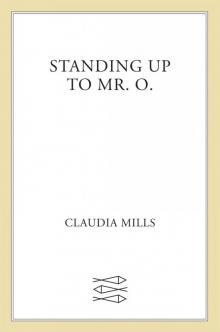 Standing Up to Mr. O.
Standing Up to Mr. O.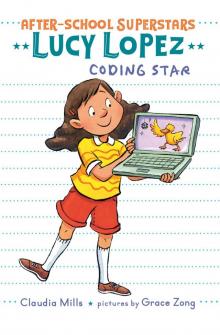 Lucy Lopez
Lucy Lopez Dinah Forever
Dinah Forever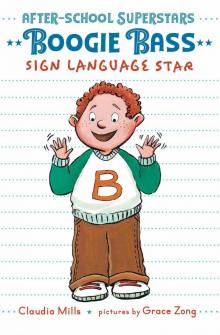 Boogie Bass, Sign Language Star
Boogie Bass, Sign Language Star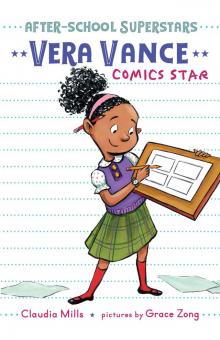 Vera Vance: Comics Star
Vera Vance: Comics Star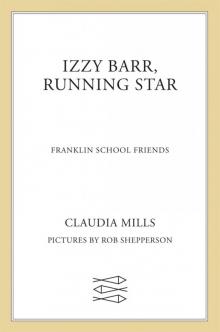 Izzy Barr, Running Star
Izzy Barr, Running Star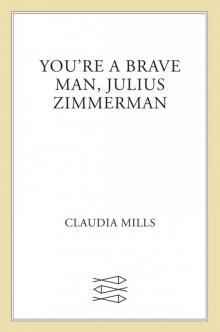 You're a Brave Man, Julius Zimmerman
You're a Brave Man, Julius Zimmerman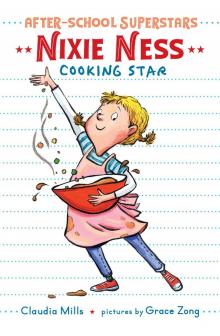 Nixie Ness
Nixie Ness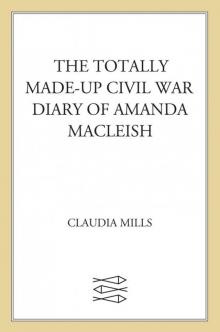 The Totally Made-up Civil War Diary of Amanda MacLeish
The Totally Made-up Civil War Diary of Amanda MacLeish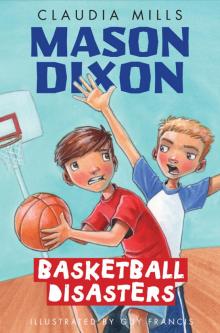 Basketball Disasters
Basketball Disasters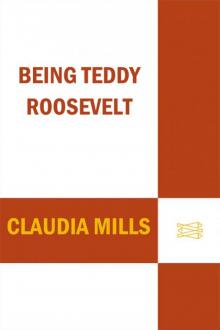 Being Teddy Roosevelt
Being Teddy Roosevelt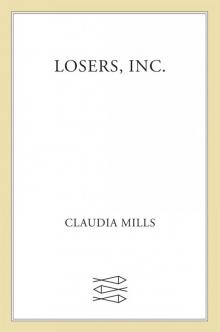 Losers, Inc.
Losers, Inc.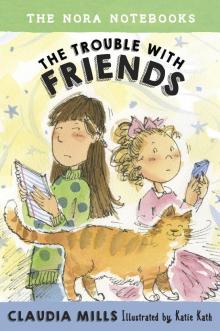 The Trouble with Friends
The Trouble with Friends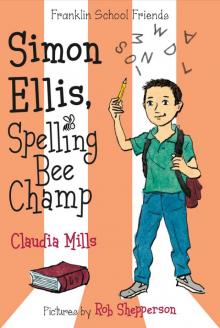 Simon Ellis, Spelling Bee Champ
Simon Ellis, Spelling Bee Champ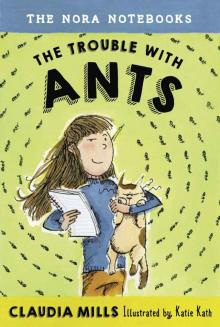 The Nora Notebooks, Book 1: The Trouble with Ants
The Nora Notebooks, Book 1: The Trouble with Ants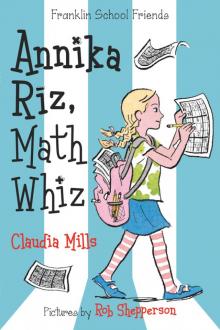 Annika Riz, Math Whiz
Annika Riz, Math Whiz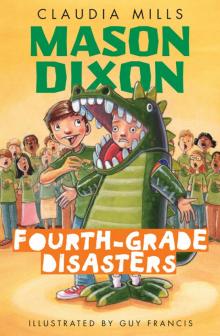 Fourth-Grade Disasters
Fourth-Grade Disasters Pet Disasters
Pet Disasters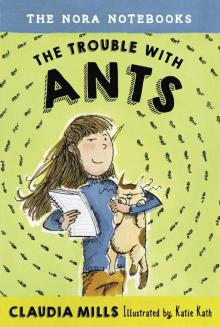 The Trouble with Ants
The Trouble with Ants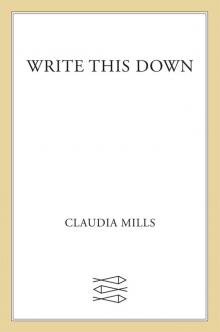 Write This Down
Write This Down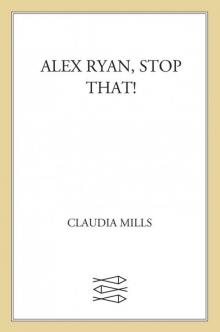 Alex Ryan, Stop That!
Alex Ryan, Stop That!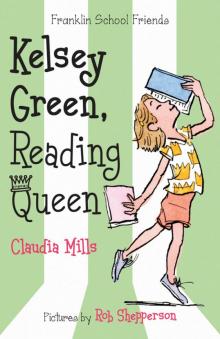 Kelsey Green, Reading Queen
Kelsey Green, Reading Queen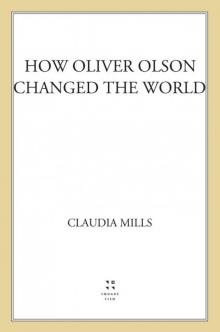 How Oliver Olson Changed the World
How Oliver Olson Changed the World Lizzie At Last
Lizzie At Last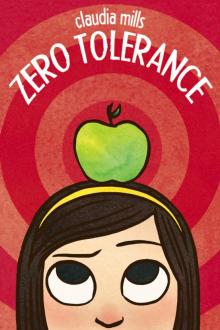 Zero Tolerance
Zero Tolerance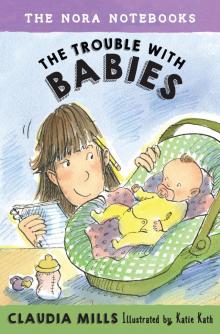 The Nora Notebooks, Book 2
The Nora Notebooks, Book 2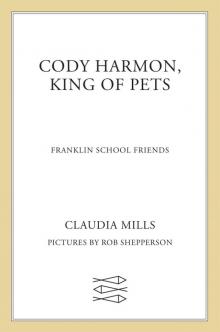 Cody Harmon, King of Pets
Cody Harmon, King of Pets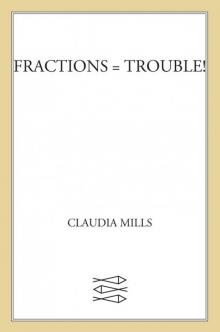 Fractions = Trouble!
Fractions = Trouble!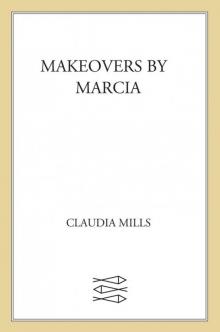 Makeovers by Marcia
Makeovers by Marcia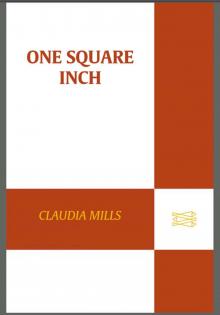 One Square Inch
One Square Inch